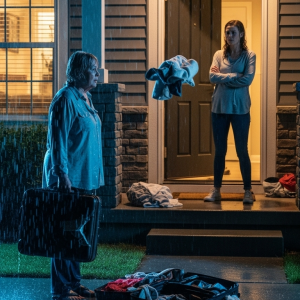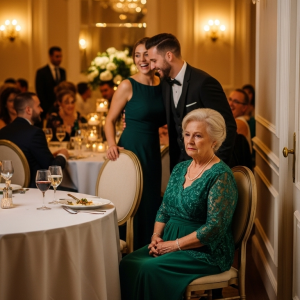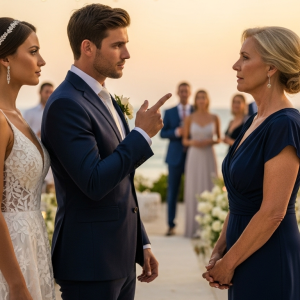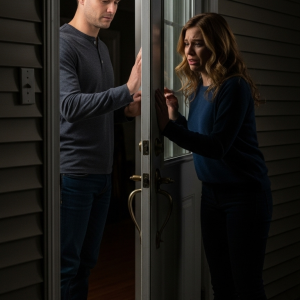My name is Clarissa Morgan. I am sixty-three years old, and three weeks ago, I buried my husband of thirty-eight years, Edward. We built this house together. Raised our children here. Watched the seasons pass through the kitchen window. But on a quiet Tuesday morning, with the funeral flowers still wilting in their vases, the calls began.
“Mom, we need to talk about the house,” my son, Brian, said, his voice devoid of pleasantries. It was the same firm, telling-not-asking tone he used when he needed money in college.
I stood in my kitchen, the coffee going cold in the “World’s Best Grandma” mug my granddaughter, Catherine, had given me. Nothing felt familiar anymore. Not the mug, not my own voice, not even my reflection in the hallway mirror. When I finally understood what Brian and my daughter, Danielle, were planning behind my back—when I realized their sudden kindness was strategy, not love—something in me broke. Or perhaps, for the first time, something in me woke up.
The next morning, Brian called again. “Danielle and I had dinner last night,” he began, all business. “We talked about your situation. It’s not sustainable, Mom. That house is too big for you. It’s time to think about next steps.”
I stared out the window at the herb garden Edward and I once tended, now grown wild. “There is no mortgage,” I said flatly.
A pause, then a sharp, cutting laugh. It was a sound his father once made, but where Edward’s held warmth, Brian’s held only dismissal. “Mom, you don’t need to pretend. Dad’s pension can’t cover everything. We’re worried.”
They weren’t worried. They were circling. He launched into a pitch as if I were a client. He and his wife wanted a new house. Danielle was struggling with Catherine’s college fund. “If we sold your house,” he said, the words slick and rehearsed, “it would be a win-win.”
A win-win for them. “And where would I go?” I asked, my voice a whisper.
“That’s the great part!” he said, his tone bright and false. “Danielle has that finished basement. You’d have your own entrance. It’s cozy.” He made it sound like an upgrade, not a demotion to a subterranean life.
“That basement floods every spring,” I said quietly.
“It’s been fixed! And you’d have Catherine to keep you company. Maybe help with meals. You know how Danielle struggles.”
I didn’t respond, my mind flashing to last Thanksgiving when I was seated alone downstairs while the family dined above. I remembered how Danielle hadn’t called once after the funeral. Brian pressed on, undeterred.
“Lisa’s cousin is a realtor. He has a cash buyer. Quick close. We could wrap this all up in a month. Start fresh.” He said it like he was doing me a favor, as if erasing my life was just an item on a checklist. “We’re telling you this because we care, Mom.”
What he meant was: We want your house, and we are not asking.
That evening, a message from Danielle buzzed on my phone. Mom, Brian told me about the house. I know it’s hard, but it’s for the best. Catherine’s so excited to have grandma living closer!
Details. As if my grief had a project timeline. Catherine was excited? My granddaughter, who hadn’t sent a single personal text since Christmas, hadn’t checked in once after her grandfather’s funeral, was suddenly thrilled? The message wasn’t about care; it was about convenience. A tidy solution where I would be out of sight but close enough to be useful.
That night, for the first time since Edward’s death, I spoke the words aloud to the empty kitchen table. “I am not a burden. I am not invisible.” And I was done pretending otherwise.
The next morning, I walked into Edward’s study. His scent—old books and aftershave—still lingered. I opened the bottom drawer of his desk, the one he always said held “boring paperwork.” Inside, beneath years of tax returns, was a thick, navy blue folder.
It contained bank statements, investment summaries, and legal documents. And then, tucked between them, was a deed to a house. Not in Ohio, but in Marbella, Spain—a coastal town I’d only heard Edward mention once. There were photographs, too: a whitewashed villa with blue shutters, a terrace with a sea view, a garden of lemon trees. On the back of one photo, in Edward’s handwriting: “A place where no one needs anything from us. Just peace.”
Then I found the sealed envelope with my name on the front. Inside was a letter, to be opened thirty days after his passing.
My dearest Clarissa,
If you’re reading this, then the silence I tried to spare you from has arrived. I know our children. I love them, but I know them. I suspect they’re already circling, convinced they know what’s best for you. They don’t.
You are not fragile. You are not to be managed. Everything we saved, everything we built—it’s yours. Not to protect, but to live. Go to the house. See the world we dreamed of. Choose yourself.
And when you sit on that terrace with the sea in front of you, know that I always believed in your strength.
Love, Edward
I read it three times. When I finally looked up from the page, the path forward was utterly, terrifyingly clear.
Two days later, I sat across from Connie West, Edward’s longtime estate attorney. Her office smelled of leather and old paper.
“Mrs. Morgan,” she said, unfolding the documents. “Your husband was meticulous. He left nothing to chance.”
I nodded, clutching Edward’s letter in my purse like armor.
“He created a revocable trust in your name,” she continued. “All assets—this home, the investments, the Spanish property—are yours alone. Your children were never named as beneficiaries. Only the life insurance policy goes to them.”
I exhaled slowly. He had known. He had seen the parts of his children that I had refused to admit.
Connie slid another envelope across the desk. “He also opened a separate account last year. He called it your ‘Independence Fund.’ There’s $50,000 in it. He said it was for ‘when Clarissa finally lives for herself.'”
My throat tightened. “And the property in Spain?” I asked quietly.
“Fully paid off. You have legal ownership. He even hired a local property manager. The house is ready for you tomorrow if you’d like.”
Move in. The words stirred something deep inside me. For the first time, someone had spoken about my future without trying to manage it. It wasn’t about what I could give; it was about where I could go.
“Do you want me to draw up the documents to reaffirm your ownership?” Connie asked gently.
I met her gaze. “Yes,” I said, my voice steady. “It’s time.”
The moving truck arrived at 7 a.m. sharp, just as Brian’s car pulled into the driveway. Dressed in his “serious meeting” suit, he clutched a folder thick with what I assumed were sales contracts.
I met him at the door wearing the red dress Edward had always loved. My hair was styled. There were no tears in my eyes.
“Mom,” he snapped, his eyes wide with confusion. “What is going on?”
“Good morning, Brian,” I said calmly. “I’m having some things moved.”
He brushed past me, his gaze landing on the labeled boxes. “These are mine! My childhood things! Why are you packing them?”
“Because I thought you’d want them,” I replied smoothly. “Memories are precious, and I won’t be needing them where I’m going.”
“You’re not serious,” he stammered. “The buyer is expecting an answer by noon.” He paused, a flicker of suspicion in his eyes. “Brian, where exactly did you tell the realtor the money from this sale would go?”
He didn’t answer.
“You assumed I was struggling,” I continued, my voice even and strong. “But did you ever once ask what your father’s pension provides? Or how we managed our investments? Or whether I wanted to stay in the life I built?”
“Mom, we were trying to help!”
“No, Brian. You were trying to manage me like a spreadsheet. A liability to be dealt with.”
Before he could respond, my phone rang. It was Danielle. I hit the speaker button.
“Mom, what is this insanity?” she shrieked. “There’s a moving truck at my house trying to deliver that old piano!”
“The one you begged for when you were eight?” I said. “I thought you’d want the memories.”
“I don’t want the piano!” she snapped. “Brian said you’re not going through with the house sale!”
“That’s correct.”
A stunned silence. Then, her voice cracked. “But… you can’t afford…”
“I can afford more than you ever gave me credit for,” I interrupted. “I’m leaving. But not for your basement.”
Then, calmly, quietly, I delivered the final blow. “I’m leaving because I finally remembered who I was before I became your convenience.”
Twelve hours later, I was on a flight to Madrid. At customs, the officer asked, “Purpose of visit?” I smiled. “Starting over.”
The caretaker Edward had arranged, Pilar, greeted me like an old friend. As we drove through Marbella’s winding streets, every lemon tree and flash of blue sea felt like a secret Edward had saved just for me. And then we arrived. A whitewashed villa, blue shutters, and a terrace with views of the Mediterranean that made my knees weak.
“He left this for you,” Pilar said, handing me a brass key. “He said this house was your reward for a life well-lived.”
That night, I stood on the terrace with a glass of wine, watching the last light fade over the sea. The waves crashed below, a steady rhythm like a heartbeat, reminding me I was still here. For the first time in a very long time, I felt not empty, but full. Not lonely, but free. I didn’t miss my children. I missed the version of myself I had almost forgotten. And I had just found her again.
Four days passed in quiet peace. Then, as the sun was setting, my phone buzzed. For the first time since Christmas, Catherine’s name appeared on the screen.
“Grandma?” Her voice cracked with emotion. “Thank God. I just found out… Mom told me you’d been sending money for my college tuition. All this time, she never said it was from you. Why didn’t you tell me?”
I leaned against the terrace rail. “Because I didn’t need the credit, Catherine. I just wanted to help.”
“I’m so sorry,” she sobbed. “I let them convince me you were fragile, that I shouldn’t call. I wasn’t giving you space. I was abandoning you.”
Tears welled in my eyes. “You’re here now. That’s what matters.”
Then came the words that caught me off guard. “Can I come see you? Spring break is in three weeks. I don’t want to go to Cancun. I want to come to Spain. I want to know you. Really know you.”
Three weeks later, I stood at the arrivals gate. The young woman who ran into my arms was not the polished version from holiday photos, but someone real, wearing worn jeans and a messy bun. Her hug was strong and true.
That evening, on the terrace, she asked, “Tell me about your life here. I want to know everything.” For the first time in years, someone wasn’t asking what I could give. They were asking who I was.
Later that week, she sat with me on the beach. “Grandma,” she said, “I think I want to stay longer. I don’t want to go back to pretending.”
I looked at her, my granddaughter, my unexpected friend. And I smiled. “Then stay,” I said. “Let’s figure it out together.”
Because family isn’t built on obligation or inheritance. It’s built on presence, on honesty, on love that asks for nothing but gives everything. It is never too late to choose yourself. Never too late to begin again. And never, ever too late to be seen.
The days in Spain began to move differently, like the tide. No longer dictated by other people’s schedules or demands, my hours stretched wide and open, filled with the sound of gulls overhead and the citrus scent drifting from the lemon trees.
At first, I didn’t know what to do with all this freedom. I would stand on the terrace at sunrise, the Mediterranean glowing gold, and ask myself: What now?
Edward’s absence was a wound, but here, in this villa he had prepared in secret, the wound began to heal into something gentler. The grief was still sharp, yes—but it no longer swallowed me whole.
I found myself walking into the village each morning. Pilar introduced me to shopkeepers who greeted me as though I had lived here for years. There was a baker, Alejandro, who insisted I try his olive bread still warm from the oven. There was Maria at the flower stall, who tucked sprigs of lavender into my purchases with a wink. For the first time in decades, people wanted nothing from me but my company.
When Catherine arrived for her spring break, the rhythm of my days changed again.
She was wide-eyed when she stepped into the villa. “Grandma, it’s like something out of a movie,” she whispered, running her hand along the cool white walls, peering out at the sea that stretched endlessly beyond the terrace.
That first night, we cooked together in the small kitchen. She chopped vegetables while I seasoned fish, and we laughed when the pan sputtered too much oil. It was the kind of ordinary intimacy we had never shared before—two women, two generations, bridging years of silence with laughter.
After dinner, she admitted quietly, “I don’t really know how to cook. Mom always ordered takeout. Dad ate late at work.”
I handed her a plate of grilled sea bass and smiled. “Then we’ll learn together.”
Every day brought a new discovery. Catherine wanted to see everything—Marbella’s old town, the market by the marina, even the quiet monastery tucked in the hills. But what surprised me most was how often she wanted to simply sit with me. On the terrace, on the beach, at the café down the street—she asked me questions. About my childhood. About how Edward and I met. About the dreams we never chased.
“Grandma,” she said one afternoon, her notebook open in her lap, “I’ve been thinking of switching my major. I don’t want finance. I want art history. But Mom says it’s useless.”
I looked at her, really looked at her. The girl who had once been distant, polite, almost rehearsed, was now raw and unfiltered. “And what do you say?” I asked.
Her eyes flickered, uncertain. “I say… I come alive when I’m in a museum. I lose hours sketching. I say I can’t imagine being chained to a desk counting someone else’s money.”
I reached over and squeezed her hand. “Then listen to that voice. It’s the truest one you’ll ever have.”
She leaned her head on my shoulder, whispering, “I wish you’d been there to tell me that years ago.”
The words pierced me. But instead of sinking into guilt, I allowed myself a softer truth: I couldn’t change the years already lost, but I could shape the ones ahead.
As spring deepened into early summer, Catherine began to paint in the villa’s garden. She strung canvases between lemon trees, her fingers smudged with blue and gold. I would bring her water or a plate of figs, watching as the girl I once thought I’d lost bloomed before me.
It was during one of those quiet afternoons that Pilar arrived with mail. Among the envelopes was a letter from Ohio. The handwriting was unmistakably Brian’s.
I sat with it for a long time before opening it. His words were sharp at first, accusing—how could I leave without a word, how could I embarrass them with such dramatics? But beneath the bluster, there was something else: fear. He and Danielle had been counting on the sale. They had made promises, perhaps even debts, on money they assumed was theirs.
At the bottom of the page was a single line: “You’ve abandoned us.”
I folded the letter, placed it back in the envelope, and set it aside.
That night, I told Catherine about it over tea. She frowned. “Abandoned them? They were trying to bury you alive in Danielle’s basement. Grandma, you saved yourself.”
Her words were a balm. For years I had been conditioned to believe my worth existed only in service to others. But here was my granddaughter, seeing me not as a resource but as a person reclaiming her life.
And I realized then: the cycle could end with me. I did not have to pass down silence, resentment, or duty disguised as love. I could pass down courage.
One evening, Catherine brought out a painting she had been working on secretly. It was of the terrace—the sea in the distance, the lemon trees in bloom, and two women sitting side by side. I recognized us instantly.
“It’s not finished,” she said, nervous. “But I wanted you to see.”
I felt tears well in my eyes. “It’s perfect,” I whispered.
For the first time in my life, I hung a painting not because it matched the curtains or fit a guest’s taste, but because it reflected my truth.
Weeks turned into months. Catherine extended her stay, deferring her summer internship. Together we discovered a rhythm of independence and togetherness. I began volunteering at the village library, reading to children in broken Spanish. Catherine enrolled in a local art course, her confidence growing with each sketch.
One afternoon, as we walked along the promenade, she turned to me. “Grandma, do you ever regret it? Leaving Ohio? Leaving them?”
I thought of Edward’s letter, of Brian’s demands, of Danielle’s manipulations. And then I thought of the lemon blossoms, the sea air, the laughter I now shared with Catherine.
“No,” I said firmly. “I regret waiting so long to choose myself. But regret only matters if you let it stop you. I didn’t. And neither should you.”
She nodded, her eyes bright. “Then neither will I.”
That night, as the waves crashed below, I wrote in my journal:
This house is not just a gift. It is a beginning. Edward gave me freedom, but I had to decide to take it. And now, with Catherine by my side, I see that freedom is not something you hold alone. It’s something you pass on.
For the first time in years, I looked ahead—not with fear, but with anticipation. My life was not ending; it was unfolding.
And I whispered into the sea air, a vow to Edward, to myself, and to the generations after me:
“I am not invisible. I am here. And I am just getting started.”




